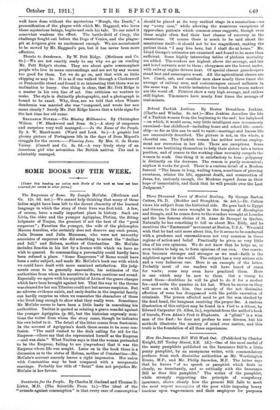should be placed at its very earliest stage in a
sanatorium—we say " every case," while allowing the numerous exceptions of upper-class patients which common sense suggests, though even these might often find their best chance of recovery in the sanatorium. Of course there is much to be said about the sanatorium itself—it should not be too magnificent, making the patient think " I may live here, but I shall die at home." Mr. Lloyd George's estimates are examined and found to be more than sufficient. Some highly interesting tables of phthisis mortality are added. Tin-workers are highest above the average, and inn and hotel servants next to them ; clergymen are the lowest under, with railway engine drivers next. Of special classes gamekeepers stand best and messengers worst. All the agricultural classes are low. Coach, cab, and omnibus men skew nearly three times the average of railway men, and costermongers exceed milkmen in the same way. In textile industries the brush and broom makers are the worst off. Printers show a very high average, and cutlers still higher. Tin-miners have nearly four times the average of coal-miners.














































 Previous page
Previous page